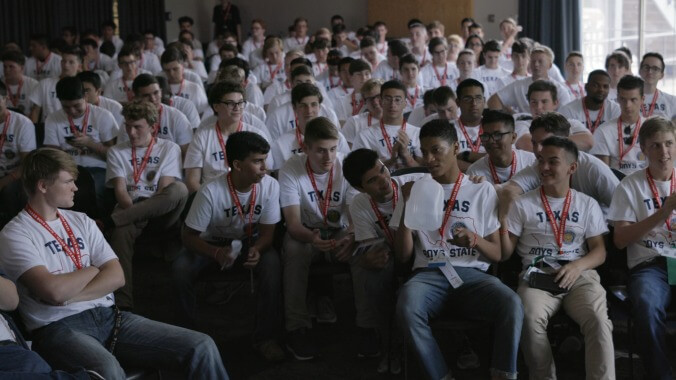In Boys State, politics is kids’ stuff


Every summer, young men from across Texas converge on the state capital of Austin to build a government from the ground up. For one week, the thousand-plus teenagers are sorted into “cities” and run for offices at the municipal, county, and state level; they’re also assigned affiliation with one of two political parties—Nationalist or Federalist—whose platforms they’re tasked with assembling from scratch. Only a small percentage of the population will experience firsthand this pop-up ecosystem, which has its own wardrobe, customs, and honest-to-goodness media network. In other words, Texas Boys State is documentarian catnip.
While the American Legion and American Legion Auxiliary runs Boys and Girls States nationwide, Texas Boys State caught the attention of filmmakers Amanda McBaine and Jesse Moss through one major faux-legislative stunt: In 2017, its “statesmen” (the parlance for attendees) were the first in the program’s history to approve a measure to secede from the United States. Rumbles of a 2018 repeat are swiftly quieted in the early goings of McBaine and Moss’ Sundance hit Boys State, but the Lone Star setting remains valuable to the film nonetheless. It provides an outsized character to the proceedings, and gives the entire large-scale experiment in American civics a natural antagonist in the form of rugged Texan individualism.
The film is therefore primed for what one of its participants fears might be a conservative indoctrination course. The whole Boys State enterprise is rooted in a flag-waving American exceptionalism, after all, and as the filmmakers take a bus ride from the Houston area with one of their main subjects, Steven Garza, the soft-spoken kid in the “Beto For Senate” T-shirt listens as one of his fellow Austin-bound passengers talks about disagreeing with Donald Trump but wanting the president to succeed, before another describes Barack Obama as “near socialist.” Boys State raises the question early, and returns to it again and again: Where did these kids get these talking points, how sincere are they in their beliefs, and will they stick to them if it means winning or losing a seat in the mock government?
But it’d be be far too easy to characterize Boys State (the movie and the program) by the kid who takes the podium to shout “our masculinity shall not be infringed,” or the sea of white faces seen in an early assembly sequence. Instead, McBaine and Moss zero in on four teens who better exemplify a cross-section of a state that makes up 7% of the U.S. map. Steven’s mother came to the U.S. from Mexico and lived undocumented for a period of time. Debate whiz René Otero is a Black kid raised in Chicago who marvels at the variety of cultures and perspectives he was exposed to after his family moved to Texas. When Reaganite political-operator-in-training Ben Feinstein shows one of his prosthetic legs to a fellow statesman, he flashes a star-spangled sock. Only Robert MacDougall—who, along with Steven, runs for the Nationalist gubernatorial nomination—conforms to any good-old-boy preconceptions. But cowboy-boot soundbites and rifle-cocking B-roll belie an inner conflict that emerges in the heat of the race, a “Made ya look!” ploy Boys State indulges in only sparingly.
The spine of Boys State emerges from the subjects’ aligning interests and aspirations: Steven and Robert as primary competitors, René and Ben as rival state party chairs. It makes for a smooth transition from the anthropological study of the early goings to the more heart-racing, but also more conventional, election procedural of the second and third acts. While the stakes get higher, Boys State starts to feel smaller, elbowing out peculiarities such as a state legislature that turns its attention to banishing Prius owners to Oklahoma after their secession schemes are squashed. But little glimpses of the society-within-a-society still crop up as McBaine and Moss play up the ballot-box theatrics, like the kid-run TV and podcast operations bringing the news to their fellow statesmen, or the campaign memes that would be inscrutable to all but 1,100 teenage boys who spent a week on the University of Texas campus in 2018.
Here, as in the real world, all’s fair in politics and social media until somebody gets hateful: The motivation behind a push to impeach René starts out on questionable footing, then veers directly into a racist Instagram account. Boys State has noble aims when it comes to teaching teenagers how their leaders are chosen and held accountable, but Boys State shows that those aims can only do so much to keep the uglier side of that process at bay. The cameras are there as an urge to win begins to supersede a desire to do the right thing, whether its Steven soft-playing his gun-control stances in order to appeal to his Second Amendment-defending constituents, or the 11th-hour rat-fucking spree Ben goes on in support of the Federalists’ candidate for governor. There are calls for bipartisanship, compromise, and understanding voiced throughout Boys State—but there’s also a subtext about how nobody, no matter their age, is safe from the corrupting influence of power.
When it’s most busily illustrating all the parallels between this training-wheels version of representative democracy and the real thing, Boys State can lose sight of the first half of its title. It’s way too easy to forget that we’re watching a bunch of kids. This has the effect of demonstrating how the parallels run both ways—that the mud- or meme-slinging tactics of modern politicking occur just as readily to a bunch of mostly unsupervised 17-year-olds as they do to professionals more than twice their age—but it’s also the downside of focusing so intensely on the gubernatorial race or following someone with René’s poise or Steven’s experience in grassroots stumping. Sequences from a talent show or glimpses at intramural activities don’t fully recover the fact that we’re watching scenes from a social-studies sleepaway camp. When the end comes, and the statesmen drop their macho fronts to tearfully thank each other for their support, or mourn the severing of bonds formed so quickly and intensely, it’s an abrupt emotional beat. With so much attention paid to the campaign trail, Boys State fails to show us how the waterworks get built.
But that too could be a subtle critique of an electorate obsessed with the horse race while overlooking the unglamorous day-to-day work of governing. If it’s hard to tell, that’s because Boys State isn’t one for definitive statements: Both the boys and the state are works in progress. This moment in their life has been preserved for posterity, but it’s just a few days out of those lives, and they’re not going to be the people we see here forever. (According to the directors, Ben has already come to “question some of the bad decisions” he made on-camera.) Ever the charismatic speaker, Steven offers up a possible epigram for Boys State when he tells his fellow statesman that they can “show the adults that the kids are all right, and we can do it better than them.” But this, from Robert, might be just as fitting: “That’s politics. I think.”